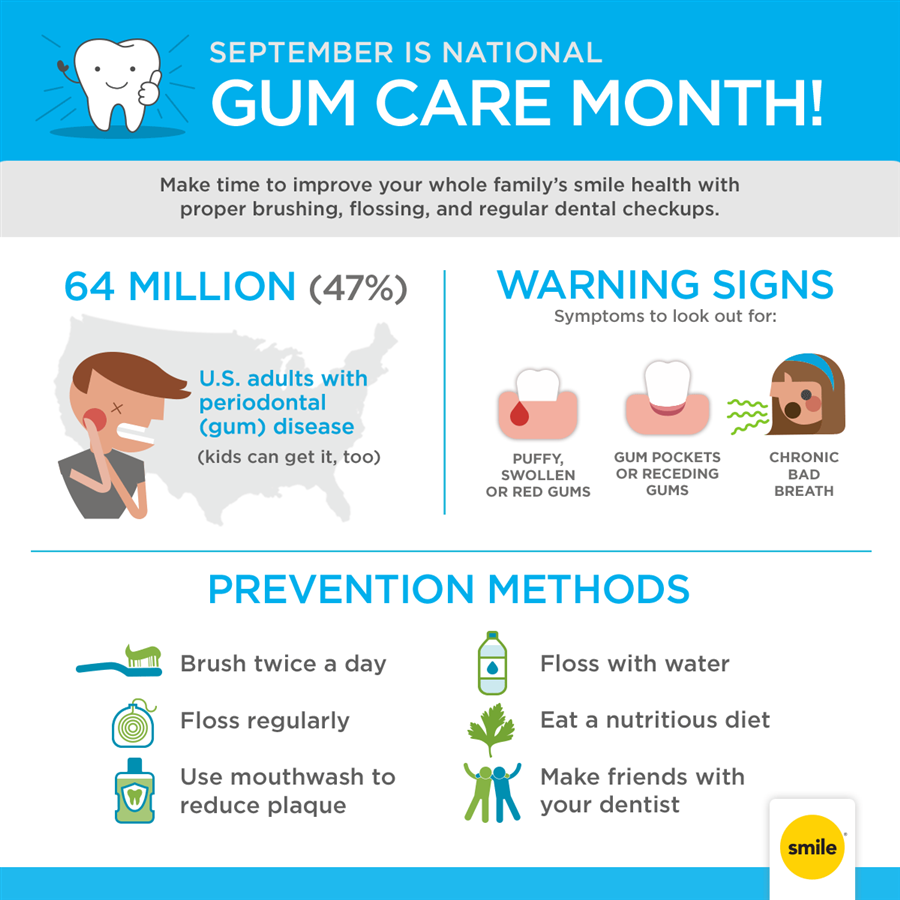
Dr. Caye and his team at Premier Dental join dental practices and professionals around the country each September in celebration of National Gum Care Month. Why is gum care so important? Let’s dive in and find out!!
You may not have heard of Periodontal Disease, if you visit your dentist regularly and you haven’t – that’s probably a good sign! Periodontal Disease is also known as Gum Disease and almost 50% of adults have some form it. Here’s the scary part – if left untreated, it can lead to even more serious problems, ranging from tooth loss to heart disease.
Yes … that’s why Gum Care Month is SO IMORTANT!! However, Gum Disease can be prevented!
There are several preventative actions you can take to help avoid the onset of gum disease. We want you to be on the lookout for these tell-tale signs so, we’ve gathered some interesting information and statistics for you as well.
There are two forms of Gum Disease:
Periodontal disease starts with a sticky film of plaque bacteria that forms on your teeth, just like tooth decay (when you’re getting a cavity). If plaque is not removed, it will collect around your gum line and they’ll become inflamed and irritated. This early stage of gum disease is called Gingivitis. The good news is that it can be reversed easily with consistent and thorough brushing and flossing.
However, if it is not removed regularly, this plaque will harden into tartar. Your gums become increasingly red, swollen, and inflamed as tartar builds up around the gum line and they will eventually pull away from the tooth, forming a loose pocket. As more bacteria and tarter accumulate in these “pockets”, the destructive toxins begin to infect and destroy the gums, bone and ligaments that support your teeth. This advanced phase of Gum Disease is called Periodontitis, or Periodontal Disease. If left untreated, periodontal disease can lead to tooth loss, because the gums can no longer hold your teeth in place.
Here are a few staggering statistics we’d like to share with you during Gum Care Month:
We know what you’re thinking … I had my 4 wisdom teeth pulled!! No wonder these numbers are so high!! Bad News: These statistics do NOT include wisdom teeth that have been removed AND this tooth loss is typically caused by gum disease.
Related Article: Dentures vs Dental Implants: Everything You Need to Know
There are different forms of Periodontitis and it is more serious than it may seem at first.
It’s a well-known fact that people with a healthy smile tend to look younger. However, Periodontitis affects much more than the aesthetic look of your pearly white smile and is important for more than cosmetic reasons.
It’s also easy to understand that it’s easier to talk and chew when your teeth are functional and it’s less costly to keep all of your own teeth.
Gum disease is also a systemic disease that is related to the body’s reaction to bacteria that can have far-reaching effects on your overall health. By completely avoiding periodontal disease or treating it, you’re helping to protect your body from other systemic inflammatory conditions, such as heart disease, diabetes, and autoimmune conditions. As well as, osteoporosis, respiratory disease, and cancer.
Related Article: Dental Awareness: Is My Overall Health Really Tied to My Oral Health?
Do your gums bleed when you brush your teeth? If so, you can assume your gums are sick. Symptoms are key … if you are experiencing ANY gum bleeding, notice any gum pain or mouth sores, and/or pick up on a sour taste in your mouth, do not hesitate – it’s time to schedule a visit to your dentist! Remember, you can reverse the early stages of Gum Disease, but the only way to keep Gingivitis from progressing into Periodontal Disease and other problems is dental treatment.
Here is a more extensive list of symptoms:
Healthy gums are pink, firm, and they do not bleed.
Keeping your gums firm, pink and healthy isn’t difficult, but it does require consistent healthy oral care habits. Your main focus is to keep the harmful oral bacteria to a minimum, not just during gum care month, but always!
If you have children, take this opportunity to review their dental care routines and emphasize the importance of daily tooth care. A clean mouth can´t get sick!
Related Article: Children’s Dental Health is Important at Premier Dental
Now you understand why we take Gum Care Month seriously and keeping your gums healthy is such an important task – they keep your teeth in place! AND you know what to do to help keep you and your smile in the best possible health and avoid Gum Disease.
If you have questions or concerns about your gum health, please give us a call, Dr. Caye and his experienced team at Premier Dental in Lee’s Summit will be happy to schedule your dental appointment and help you keep your gums, teeth and mouth healthy. Enjoy National Gum Care Month and please call our office at 816-600-6330 to schedule your dental appointment.
Dr. Stephan Caye and his friendly, experienced team at Premier Dental offer affordable family dentistry and invisible braces in the Lee’s Summit, MO area. Our office is conveniently located off of Highway 50 and SE Blue Parkway. We offer appointment times Monday through Friday to meet your needs. At Premier Dental, we provide most dental health services, from family and general dentistry to specialty procedures, including tooth replacement options, such as dental implants and dentures, endodontic or root canal treatment, teeth whitening, cosmetic dentistry, emergency dental care and much more. We accept most dental insurance plans and offer affordable financial solutions for any budget. Please call us at (816) 600-6330 to schedule an appointment.